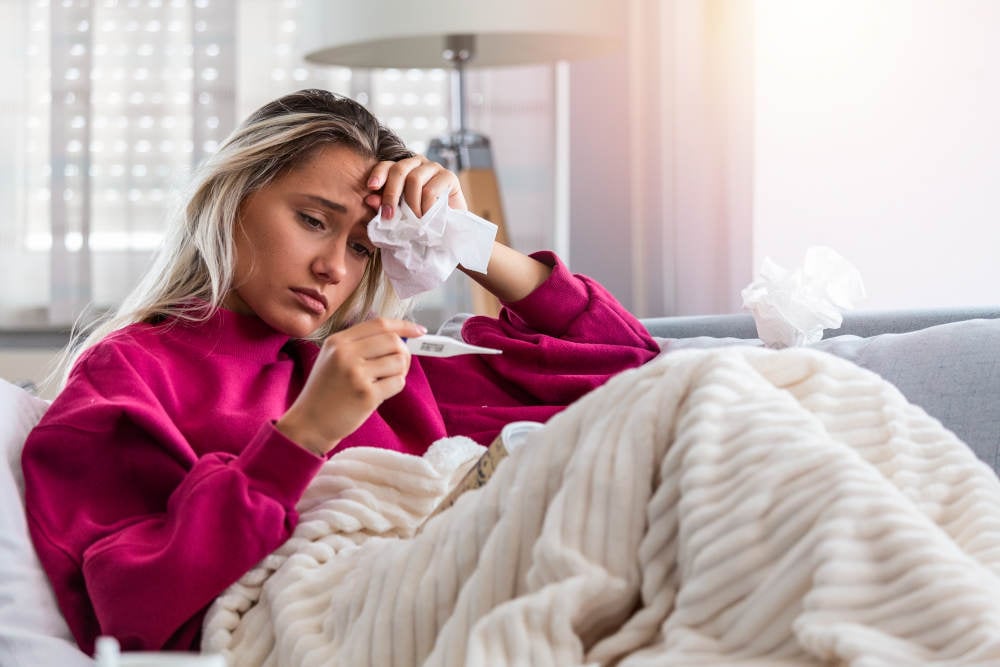Allergies vs. Cold: What’s the Difference?
Allergies and colds have many of the same symptoms, so it may be tricky to tell them apart. However, there are some key differences between the two to know. Learn how to tell the difference between allergies and a cold so you can get the relief you need.
Allergies are not caused by viruses and cannot be spread.1 Instead, they are caused by your immune system having a reaction to a certain trigger substance. Exposure to this substance causes your immune system to release chemicals — like histamines — to defend your body against the allergen. These histamines are also what cause allergy symptoms.
Some common allergens cause upper respiratory symptoms like sneezing and runny nose. These include:2
Pollen from trees and grasses
Pet dander
Dust and mold
Other allergens can cause more systemic reactions that present as rashes, redness, or hives on the skin.*1 Examples include: 2
Certain foods like nuts, soy, fish, wheat, eggs, and milk
Latex
Bee or wasp stings
Certain medications, such as penicillin
On the other hand, the common cold — or more simply, a cold — is the result of a virus that causes the linings of the nose and throat to become inflamed. There are over 200 different viruses that cause a cold, but rhinoviruses are the most common.3
A cold can be spread from person to person by airborne droplets that sick people cough or sneeze out. If a person is nearby, they may inhale those droplets and become infected with the virus themselves. A cold can also be spread when a sick person touches surfaces like doorknobs, then others touch them.3
*Note: BENADRYL® is not indicated for the treatment of food allergies, bee stings, or reactions from medication. For itchy, painful insect bites, use BENADRYL® topical products.
Cold vs Allergy Symptoms
Colds and allergies share similar symptoms, such as:1
Coughing
Sneezing
Runny or stuffy nose
Sore throat
Some questions you can ask yourself to figure out if you have a cold or allergies are:
How long have you been experiencing symptoms? |
|---|
YES | NO |
Colds may last 3 to 14 days | Allergies can last weeks or months if you don’t reduce your exposure to what’s triggering them |
Do you have a fever? |
|---|
YES | NO |
Fever is uncommon but a possible symptom of colds | Allergies do not cause a fever |
Do you have aches and pains? |
|---|
YES | NO |
Aches and pains are a symptom of colds | You typically do not get aches and pains from allergies |
Do you have itchy, watery eyes? |
|---|
YES | NO |
Allergies love making your eyes itchy and watery | Colds rarely bother your eyes |
Can You Experience Allergies in the Winter?
As the seasons change, you may be wondering if it is possible to get allergies in the winter. Seasonal allergies are most common in the spring and summer, when there is pollen from blooming flowers, trees, and grasses. While less common, you can also experience allergies in the winter. Common winter allergens mainly come from things that are indoors, such as dust mites, molds, and animal dander.4
If you begin to have symptoms of a cold or allergies, take note if you have a fever, aches, and pains. This most likely means you have a cold, which you are more likely to get in the winter and spring.5
How to Treat Your Symptoms
Allergy and cold symptoms can be bothersome and interfere with your day-to-day life. Fortunately, there are plenty of at-home treatments you can use for relief.
Treating Allergy Symptoms at Home
In addition to avoiding your allergy triggers, allergies can be treated with several over-the-counter medications, such as pills, liquids, eyedrops, and nasal sprays. Some of these medications contain antihistamines to help combat the source of your allergy symptoms.2
For allergy relief from sneezing, itchy throat, watery eyes, and runny nose, use BENADRYL® Allergy. For allergies along with sinus pressure and congestion, use BENADRYL® Allergy Plus Congestion for relief. In children with allergies, Children’s BENADRYL® Allergy Plus Congestion relieves all the same symptoms.
Treating Cold Symptoms at Home
Colds are caused by viruses, so you cannot use antibiotics to treat them — instead, they must run their course. Some at-home remedies for treating a cold that help you feel better include:
Hydration with water, clear broth, juice, or warm water with lemon and honey
Gargling salt water to help relieve your sore throat
Taking over-the-counter medications to relieve pain, congestion, and stuffiness
Using a humidifier to add moisture to the air, which can help loosen congestion in the nose and chest
Can BENADRYL® Help Relieve Cold Symptoms?
Not just for allergies, BENADRYL® Allergy can also offer temporary relief from runny nose and sneezing associated with colds. If you’re dealing with nasal congestion with your cold, BENADRYL® Allergy Plus Congestion can help alleviate it.
References
Mayo Clinic. Cold or allergy: Which is it? February 17, 2022. Accessed from: https://www.mayoclinic.org/diseases-conditions/common-cold/expert-answers/common-cold/faq-20057857
Mayo Clinic. Allergies. August 4, 2020. Accessed from: https://www.mayoclinic.org/diseases-conditions/allergies/symptoms-causes/syc-20351497
Johns Hopkins Medicine. Common Cold. Accessed from: https://www.hopkinsmedicine.org/health/conditions-and-diseases/common-cold
National Jewish Health. Winter Allergy Tips. November 1, 2016. Accessed from: https://www.nationaljewish.org/conditions/allergy/overview/lifestyle/winter-tips
Centers for Disease Control and Prevention. Common Cold. December 8, 2021. Accessed from: https://www.cdc.gov/common-cold/about/



